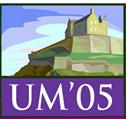
WORKSHOP on Decentralized, Agent Based and Social Approaches to User Modelling
(DASUM 2005)
organized in conjunction with
10th International Conference on User Modeling
July 25, 2005, Edinburgh, UK
| : Home : |
| : Program : |
| => Topics <= |
| : Submission : |
| : Dates : |
| : Organization : |
| : Links : |
| : Proceedings : |
| : CFP : |
Workshop Questions:
There are many questions that arise:
- How do we define a (a decentralized) user model? There is no central notion of a model, but user data fragments dispersed among the various devices, services and agents; the level of this data can be hugely different, from sensory data about user and context in ubiquitous computing systems, usage statistics in recommender systems or web-services, to detailed preference models in negotiation agents. Do we talk of all these as "models" or do we define the model in relation to the purpose for which it will be used?
- How to ensure that different autonomous, independently created applications and services are able to communicate with each other and exchange user data, if each represents its user models in a different way (ontologies, communication protocols and languages).
- Can user data harvested in one context be useful for adaptation in another context? How to interpret a user model so that it can be used in a new context? Should the "little player" do this computation or special components that know what user data is relevant for what type of adaptation? (architectures for adaptation, standard user modelling tasks / purposes).
- How to represent the knowledge necessary to compute user models on demand? What does this knowledge include? Possibly - what user data is relevant for the purpose, where to obtain it from and how to adapt the application/service. Should representations be centered around the user data, the content, or around the purposes of use? Should they be declarative or procedural? Is any data ever irrelevant? What user data to keep and what not to keep after adaptation? (knowledge representation, reasoning, learning).
- Whom to ask for user information? Who is "trusted"? How to define trust in this case: an agent that is honest, or similar to the client agent in its criteria, or both? How to use models of interpersonal relationships and how to interpret user data received from acquaintances? (trust, reputation, gossiping).
- How interpret data obtained by other players? How to resolve conflicts between user model fragments kept by different agents (e.g. using information about adaptation and purpose)? How to protect oneself from deliberate deception? When to provide data and to whom? Is decentralized and social user modelling a threat for privacy or is it a solution? Do recent developments in industry about Liberty Alliance, Microsoft Passport II, and Identity management help in distributed environment?
- What are the candidate applications: where do we expect to see such applications first? Recommender systems? Mobile / ubiquitous computing applications or ambient computing environments? E-learning systems? E-commerce systems? What is common among these application areas?
Topics:
The list of topics (not exclusive) includes:
- agents modelling other agents,
- modelling trust and similarity (affinity) between users/agents,
- modelling social relationships, networks and groups,
- user modelling within mobile and pervasive computing environments
- harvesting user and context information from ubiquitous environments
- user/agent clustering techniques,
- coalition and community formation based on user affinity and trust,
- collaborative planning,
- architectures,
- commonalities and differences between user modelling approaches on the web and in ubiquitous environments.
- applications in ubiquitous, agent-based and decentralized systems such
as:
- recommender systems, expert finding,
- web-services, multi-agent systems,
- mobile / ubiquitous / ambient computing systems,
- on-line communities,
- peer-to-peer systems,
Intended Audience:
The workshop is likely to attract researchers with interests in any combination of the following four areas:
- user modeling,
- multi-agent systems,
- mobile, ubiquitous, pervasive and ambient systems,
- user adaptive web-services, e-learning, recommender systems.